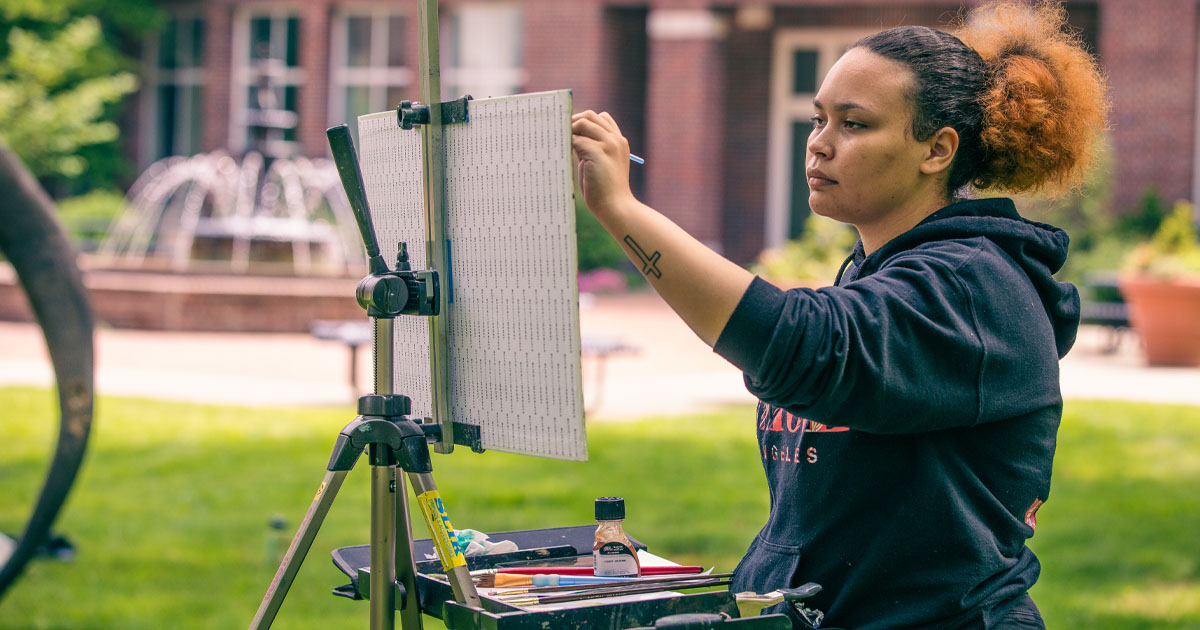SU Liberal Arts Programs First in the U.S. to Earn Essential Employability Qualities Certification
By SU Public Relations
SALISBURY, MD---What can a student do with an art, English or philosophy degree? Plenty, it turns out.
These programs in 久久国产精品久久’s Charles R. and Martha N. Fulton School of Liberal Arts recently became the first liberal arts programs in the nation to earn Essential Employability Qualities (EEQ) Certification from QA Commons, a national non-profit dedicated to bridging the gap between education and employment.
SU collaborated with the organization to measure the programs’ strengths in eight essential EEQ areas: communication, teamwork, critical thinking, creativity and problem solving, learning and adaptability, professionalism and responsibility, motivation and initiative, and digital literacy.
In addition, QA Commons assessed the curriculum for each class in the program to determine employability skills compatibility in key areas including EEQ preparation, integrated (career) support services, employer engagement, learner engagement and transparency of outcomes.
In all cases, SU’s programs shined.
“QA Commons has been a great partner in this process,” said Dr. Laurie Couch, SU provost and senior vice president of academic affairs. “Its experts work with businesses to determine what employers are really looking for in the candidates they hire and what programs best teach students those skills. The results show that these SU programs are helping students gain the communication, problem-solving and critical-thinking skills they need to succeed in the workforce.”
“There is a reason the humanities are such an integral part of undergraduate education at practically every institution,” said Dr. Maarten Pereboom, dean of the Fulton School. “Employers are realizing that ‘soft skills,’ such as teamwork and adaptability, are just as important as technical skills when it comes to peak workplace performance. Programs like art, English and philosophy provide opportunities for students to master these skills, placing them in the best possible position for employment after graduation.”
“Many liberal arts students struggle to identify their own employability skills, but can be surprised and empowered to discover just how many they have,” said Michelle Deasy, QA Commons executive director. “For educational programs, a focus on employability represents a proactive approach to continuous improvement and career development. By equipping learners and workers with the skills and resilience needed to navigate an ever-evolving job market, we can make a difference.”
QA Commons found that SU’s art graduates “come away with intensive experience in providing feedback through their critique process. These students are well positioned to thrive in work environments that require ongoing evaluation, proactive problem solving, goal setting and iterative improvement. Resilience and adaptability are required to battle through any robust creative problem.”
SU’s English Department provides practical exercises such as journal presentations, book review pitches and multimodal project presentations that “refine students’ verbal and written communication abilities, fostering confidence and professionalism,” according to QA Commons. “Particularly impressive are the learning and adaptability skills fostered through exercises that emphasize continuous improvement, feedback and reflection. These skills are critical for professional growth, innovation and success in dynamic work environments.”
In the Philosophy Department, QA Commons assessed a notable commitment to individualized mentorship and career preparation: “Faculty actively discuss career plans with students, helping students align their academic and professional goals. The program maintains an extensive and diverse alumni network, which spans several generations and includes professionals from fields such as law, finance, technology, education and more. Philosophy is widely regarded as one of the best college majors for developing critical thinking skills, and Salisbury’s program lives up to that reputation.”
Following EEQ Certification, SU officials will offer students in the programs guidance on how to best market themselves to potential employers by using specific examples of how they effectively addressed responsibilities in their classes and assignments, and the skills they gained from those actions.
Couch also plans to collaborate with QA Commons to assess and potentially certify other academic programs at SU.
“Our faculty provide amazing and impactful experiences to our students that build those skills, so I believe all of our programs can achieve EEQ Certifications,” said Couch. “We will begin reviewing a new set of programs this fall with QA Commons and hope to showcase the ways in which each develops these in-demand skills in our graduates.”
Learn more about SU and opportunities to Make Tomorrow Yours at the SU website.

